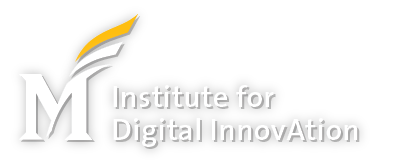Research With Impact
In this IDIA edition of faculty spotlights, we bring to you an amazing group of Mason faculty engaged in research with impact. Jana Kosecka, Bo Han, Songqing Chen, Evgenios Kornaropoulos, Brittany Johnson, and Antonios Anastasopoulos have recently obtained tech industry awards from Google, Meta, and Amazon. Their awards are a wonderful recognition of their creativity, passion, and dedication to digital innovation and, more broadly, of George Mason’s growing footprint in the nation’s research landscape.
___________________________________________________________________
Jana Ko secka, a Professor in the Department of Computer Science, has been recognized for her research on “Hand-Shape Modeling for American Sign Language Recognition” with an Amazon Research Award. Here is a summary of her project: The addition of cameras to the increasingly popular voice-controlled home assistants such as the Amazon Echo or Alexa both expands their skill capabilities and offers an opportunity to increase accessibility by no longer requiring voice or hearing. The goal of this project is to make some assistant skills accessible to Deaf or Hard-of-Hearing (DHH) users that primarily communicate through sign language. Recent research on recognition in computer vision has been propelled by large, labelled datasets, self-supervised learning, and deep networks, but so far these advances have not fully translated to ASL recognition with its complex rules depending on hand movement, shape, orientation, and location of articulation as well as whole body and face pose. We will build on our and other’s research in visual sensing, deep learning, and gesture recognition from video to advance the robustness and accuracy of American Sign Language (ASL) recognition employing self-supervised and weakly supervised deep learning approaches and applying them to complex, heterogeneous and multi-scale spatio-temporal ASL data. The research will advance the design of technologies that can improve the quality of life of individuals who are deaf and hard of hearing and more broadly help enable activity recognition in support of assistive technologies.
secka, a Professor in the Department of Computer Science, has been recognized for her research on “Hand-Shape Modeling for American Sign Language Recognition” with an Amazon Research Award. Here is a summary of her project: The addition of cameras to the increasingly popular voice-controlled home assistants such as the Amazon Echo or Alexa both expands their skill capabilities and offers an opportunity to increase accessibility by no longer requiring voice or hearing. The goal of this project is to make some assistant skills accessible to Deaf or Hard-of-Hearing (DHH) users that primarily communicate through sign language. Recent research on recognition in computer vision has been propelled by large, labelled datasets, self-supervised learning, and deep networks, but so far these advances have not fully translated to ASL recognition with its complex rules depending on hand movement, shape, orientation, and location of articulation as well as whole body and face pose. We will build on our and other’s research in visual sensing, deep learning, and gesture recognition from video to advance the robustness and accuracy of American Sign Language (ASL) recognition employing self-supervised and weakly supervised deep learning approaches and applying them to complex, heterogeneous and multi-scale spatio-temporal ASL data. The research will advance the design of technologies that can improve the quality of life of individuals who are deaf and hard of hearing and more broadly help enable activity recognition in support of assistive technologies.
___________________________________________________________________
Bo H an, an Ass
an, an Ass ociate Professor, and Songqing Chen, a Professor in the Department of Computer Science, have been recognized for their research on “Towards practical privacy-preserving spatial mapping and localization” with a Meta Research Award. Here is a summary of their project: Emerging applications of augmented reality (AR) and mixed reality (MR) heavily rely on technological innovations in spatial mapping and localization. A spatial map usually consists of sparse 3D points with visual feature descriptors to help AR/MR devices understand and interact with the surroundings. During the localization of a mobile device, a mapping server typically extracts 2D features from the camera-view image and matches them with the 3D features in the spatial map to determine the 6DoF (six degrees of freedom) pose of the device. When AR/MR applications that involve spatial mapping and localization are used in home environments or confidential industrial settings, they raise significant privacy concerns due to the sensitive visual information that can be revealed from the images and the visual feature descriptors. Besides the above privacy concerns, there may also be security attacks when AR/MR applications get more popular and are used in life-critical situations (e.g., on a battlefield or in a surgical operating room). For instance, an adversary can modify the spatial maps and uploaded images or visual features (e.g., man-in-the-middle attacks) and make the localization result significantly deviate from the ground truth. Motivated by the above issues, our long-term research goal is to design principled approaches to simultaneously preserve privacy and defend against security attacks of spatial mapping and localization in emerging AR/MR applications. In this project, we plan to make an initial step towards this ambitious goal by first exploring privacy-preserving schemes to protect spatial maps and uploaded visual data from users, aiming at preventing the disclosure of scene/image details and meanwhile retaining localization accuracy. Moreover, we intend to leverage homomorphic encryption, which can not only preserve user privacy for spatial mapping and localization but also protect sensitive data from malicious attacks.
ociate Professor, and Songqing Chen, a Professor in the Department of Computer Science, have been recognized for their research on “Towards practical privacy-preserving spatial mapping and localization” with a Meta Research Award. Here is a summary of their project: Emerging applications of augmented reality (AR) and mixed reality (MR) heavily rely on technological innovations in spatial mapping and localization. A spatial map usually consists of sparse 3D points with visual feature descriptors to help AR/MR devices understand and interact with the surroundings. During the localization of a mobile device, a mapping server typically extracts 2D features from the camera-view image and matches them with the 3D features in the spatial map to determine the 6DoF (six degrees of freedom) pose of the device. When AR/MR applications that involve spatial mapping and localization are used in home environments or confidential industrial settings, they raise significant privacy concerns due to the sensitive visual information that can be revealed from the images and the visual feature descriptors. Besides the above privacy concerns, there may also be security attacks when AR/MR applications get more popular and are used in life-critical situations (e.g., on a battlefield or in a surgical operating room). For instance, an adversary can modify the spatial maps and uploaded images or visual features (e.g., man-in-the-middle attacks) and make the localization result significantly deviate from the ground truth. Motivated by the above issues, our long-term research goal is to design principled approaches to simultaneously preserve privacy and defend against security attacks of spatial mapping and localization in emerging AR/MR applications. In this project, we plan to make an initial step towards this ambitious goal by first exploring privacy-preserving schemes to protect spatial maps and uploaded visual data from users, aiming at preventing the disclosure of scene/image details and meanwhile retaining localization accuracy. Moreover, we intend to leverage homomorphic encryption, which can not only preserve user privacy for spatial mapping and localization but also protect sensitive data from malicious attacks.
___________________________________________________________________

Evgenios Kornaropoulos, an Assistant Professor in the Department of Computer Science, has been recognized for his research on “Revisiting the privacy of cryptographically protected database search” with a Meta Research Award. Here is a summary of his project: Computing directly on encrypted data (without prior decryption) ensures privacy in a setting where a user outsources computation to the cloud. While heavyweight cryptographic primitives can address (versions of) this problem with ideal security guarantees, a series of elegant theoretical results show lower bounds that reveal the inability of these approaches to scale to realistic performance numbers. In pursuit of more practical approaches that scale to real-world datasets, the community has proposed cryptographic techniques tailored to specific tasks that also trade privacy for efficiency via a controlled disclosure of information about the underlying sensitive data. The above rationale led to the area of encrypted databases (EDB) that explore efficient designs for querying encrypted data by releasing some formally-defined and superficially harmless information, known as leakage. Even though EDB designs are accompanied by proof that nothing else is revealed except the aforementioned leakage, it is unclear what an attacker can do with this piece of information. This creates a “trial and error” situation in which designers propose a scheme and wait for the next cryptanalysis result to evaluate the overall privacy. In this proposal, our goal is to understand the leakage and quantify the privacy of EDBs by providing both definitions and practical tools that capture what an attacker can do, given a leakage profile.
___________________________________________________________________
 Brittany Johnson, an Assistant Professor in the Department of Computer Science, has been recognized for her research on “Exploring and Boosting Ethical Signals in Data-Driven Software Communities” a Google research award. Here is a summary of her project: The technological landscape continues to evolve through the use of artificial intelligence and machine learning to support automated decision making. These technological advances have led to heightened concerns around ethics and equity, which has led to a push to better understand and support these concerns in software engineering research and practice. There exist numerous interventions, from frameworks and guidelines to tooling, that aim to support ethical software development; however, it’s not clear if and to what extent these considerations and interventions are being applied in practice. Furthermore, it is not clear how to adequately support ethical considerations in AI-based software development communities. The proposed research will examine ethical software development practices through an empirical lens and work toward more effective ethical interventions. Our studies will be centered in the open-source software community, where many of the most commonly used machine learning technologies and software thrive. This research in particularly interested in communities like GitHub where conversations about ethics cohabitate with code, data, and other software artifacts. By encouraging and supporting ethics in practice, we are able to make foundational steps towards supporting the dissemination of equitable software.
Brittany Johnson, an Assistant Professor in the Department of Computer Science, has been recognized for her research on “Exploring and Boosting Ethical Signals in Data-Driven Software Communities” a Google research award. Here is a summary of her project: The technological landscape continues to evolve through the use of artificial intelligence and machine learning to support automated decision making. These technological advances have led to heightened concerns around ethics and equity, which has led to a push to better understand and support these concerns in software engineering research and practice. There exist numerous interventions, from frameworks and guidelines to tooling, that aim to support ethical software development; however, it’s not clear if and to what extent these considerations and interventions are being applied in practice. Furthermore, it is not clear how to adequately support ethical considerations in AI-based software development communities. The proposed research will examine ethical software development practices through an empirical lens and work toward more effective ethical interventions. Our studies will be centered in the open-source software community, where many of the most commonly used machine learning technologies and software thrive. This research in particularly interested in communities like GitHub where conversations about ethics cohabitate with code, data, and other software artifacts. By encouraging and supporting ethics in practice, we are able to make foundational steps towards supporting the dissemination of equitable software.
___________________________________________________________________

Antonios Anastasopoulos, an Assistant Professor in the Department of Computer Science, has been recognized for his research on “Machine Translation Beyond the Top-100 Languages” through a Meta Sponsored Research Award. Here is a summary of his project: The democratization of machine translation (MT) availability and research is well under-way, with recent works pushing the boundaries of MT research beyond the commonly studied languages to now cover around 100 languages. However, further expanding MT coverage beyond high- or mid-resource languages will require additional research efforts. The proposed work will go beyond the collection of more data, by developing metrics and methods that will take into account and leverage the particular characteristics of such languages. In doing so, we hope to enable research and creation of translation technologies for languages with millions of speakers that are not currently served by automatic translation technologies.
___________________________________________________________________
Congratulations to all these brilliant faculty! More information about the tech industry programs that have funded their research can be found at:
https://www.amazon.science/research-awards

